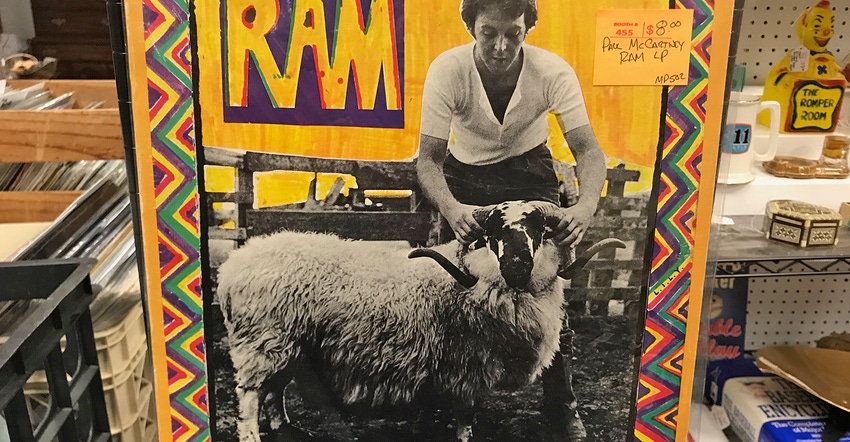
Paul McCartney is holding a sheep. I started to pass by but immediately stopped. A member of The Beatles was an aggie?
While rummaging through an antique store, I came across a record album cover with a photo of Paul McCartney and a sheep. The album was titled “RAM.” Any shepherd in his or her right mind had to take a photo, so I did.
All through the store, my mind kept going back to the picture. Did he really raise sheep, or was this a photo stunt? I had to find out.
It turns out sheep and rural living spurred McCartney’s musical comeback.
I’ll be honest, I was an infant, just 1, when McCartney left The Beatles April 10, 1970. But if you are going to put an iconic singer with a sheep, well, you’ve piqued my curiosity.
It turns out McCartney lived on a farm for a time. In a video documentary called “The making of RAM,” by the Beatles Archive, the singer describes his life after the band broke up.
Instead of staying in London, McCartney and his wife, Linda, moved to Scotland. There, the two purchased a farm.
In the documentary, he said, “You could find me in a field on my tractor, or shearing the sheep with old-fashioned hand shears.” Bet you didn’t see that coming. The couple also had horses and donkeys.
Neither Paul nor Linda grew up on a farm. Both were city dwellers for their entire lives before this move.
It is interesting to me that McCartney, known around the world, retreated to a small farm to find solace during such a tumultuous time in his life and history. More importantly, he found it. He credits the farm for providing him the opportunity to be free and see what type of music forms “out of the bare elements.”
Sense of freedom
No doubt, farming is hard work. For me, and apparently McCartney, hard work clears the mind. But I also think there is a certain sense of freedom in a rural town.
There are many times musicians and celebrities visit small rural towns across the country. But unlike our urban counterparts, there are no vehicles chasing them down the gravel roads for photos, or camping outside the local diner. You don’t read about their visits in the town newspaper or find mention of them on social media.
Perhaps it is because rural America realizes that every member of society has a role to play — whether actor, musician or farmer. And in their time off, all three want to enjoy a cup of coffee with friends, fish a spell on the lake or hunt a big buck in the woods — but do it all in a small town, where perhaps everyone knows your name, but no one really cares. You are free to do as you please. Small-town folks treat you like family.
So it makes perfect sense that McCartney chose to head to the farm, shear a few sheep and perhaps visit the local pub. There he could clear his mind, rediscover his passion and find true freedom.
But more importantly, he posed with a sheep on a record album cover! Despite my philosophical logic, it remains just flat cool.
Below is the link to the YouTube video of the Beatles Archive interview.
Editor’s note: In case you are wondering, no, I did not buy the album. I don’t own a record player and sorry, am still not a Beatles music fan — but I am definitely a fan of a guy who can handle hand shears.
About the Author(s)
You May Also Like






